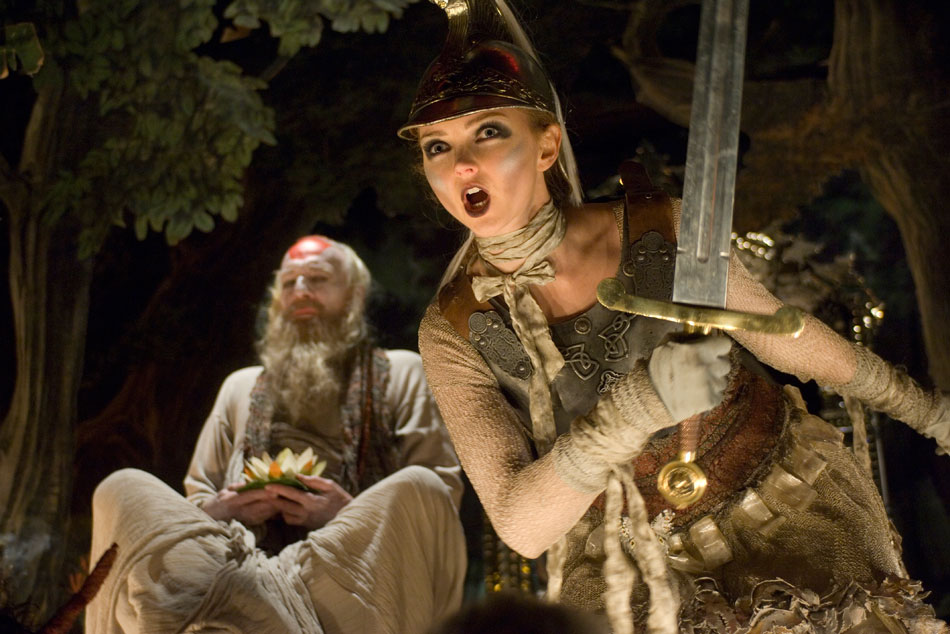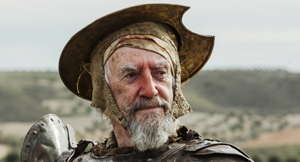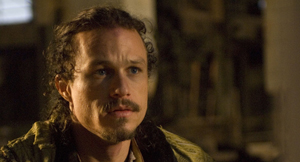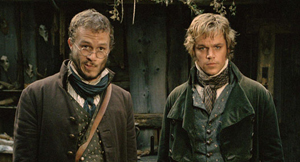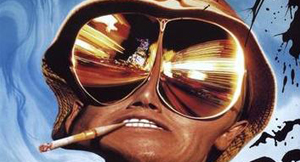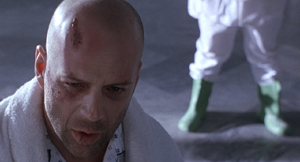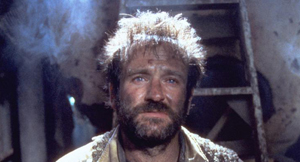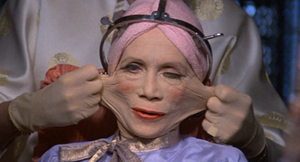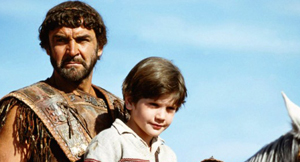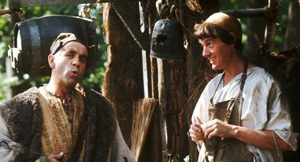To tie in with the release of his new film Tideland, Terry Gilliam agreed to answer a number of questions from fans, posted to this website in June and July. |
Phil Stubbs: If any of your pictures look unlikely to be made, might you allow them to be done as comic books?
Terry Gilliam: Funnily enough, Shekhar Kapur and an Indian company have been talking to me about me handing over scripts and ideas for development as comic books, in the hope that Hollywood would then see enough to give money to make a film. It’s actually a very clever business they’re doing, because Hollywood seems to be so in love with comics these days. So let’s start putting our scripts out as comic books, and see if Hollywood will bite. And if they don’t, at least you’ve got a good comic book. So there’s a couple of things that I’ve been thinking about…
It seems notable that with dreams and iconoclasm being your “line of work”, you never directly approach the issue of sex, you’ve never really directed a sex scene. Although the theme comes up from time to time…
It’s been overdone in the movies, I think. I don’t know what to do in a sex scene that would be original. I’m basically getting tired of it. Sex scenes seem to be an easy way out so often. They were interesting in the Sixties, when we started seeing them on film, but now I feel they are overused.
I suppose there’s another side of me that just feels it’s actually a private matter, and not one necessarily that you have to expose publicly. There’s lots of kinds of scenes I avoid because they’ve been overdone – sex scenes are one of those.
Actually, the real reason is that I’m really bad at sex!
Regarding filmmaking and storytelling, what is the most memorable piece of advice anyone ever gave to you?
I’ve never been given any good advice. That’s the problem – the only thing I keep hearing is: “cut it shorter”, which I never find to be the best advice.
Every story we tell is its own thing, each with its own problems. I don’t know what rules there are. I just know to interest the audience at the beginning, try and keep their attention during the middle bit, then end with something memorable!
Would you have any advice to young filmmakers just starting out?
Get a decent job… Something that will actually pay for your rent and food. And if you are lucky, you’ll get to make films some day!
Many people asked what your own personal influences were…
It’s a long list. I guess we start with Disney. Then we’ve got Kurosawa, Fellini, Bergman, Bunuel, Kubrick, Stanley Donen, Richard Lester. I’m totally eclectic, I’ll steal from anywhere!
Everyone knows your conflicts with certain people in Hollywood. But you’ve spent a lot of time working within the studio system. You must have had a lot of good relationships with individuals as well. How do you foster relationships with studios/individuals to get the leverage and freedom you need to make your pictures?
You get the freedom by making films that make money. So if you’ve made money easily, it’s quite easy on the next film. It’s as simple as that. There are good people out in Hollywood, and I haven’t had that difficult a time out there, but there have been a few individuals that have become the stuff of legend. But I tend to work quite well with people. I’m polite, but I don’t listen to studio people very often.
I’ve never found much good advice from Hollywood as far as solving problems. But there seem to be enough people who still like working with me. There’s still plenty of bridges that I haven’t yet burned in Hollywood.
Any likelihood that the animations you did that weren’t part of Python, short films and adverts and the like might come out on a DVD collection?
There is Monty Python’s Personal Best available on DVD. It’s not everything but it’s my version of Monty Python. It doesn’t have any live action in it. It’s a pretty good collection of my cartoons. It’s basically an hour of animation. But there isn’t one assembled source of the non-Python stuff. There’s the stuff from Marty Feldman and Do Not Adjust Your Set that I have never assembled. Maybe one day…
When you were at Cannes with The Meaning of Life, Orson Welles would have been there. Do you know what he thought of Crimson Permanent Assurance?
I didn’t know he was there and I don’t know if he saw it. I’ve no idea what he might have thought about it. On the other hand Henry Jaglom was there. He’s made lot of witty films.
During the last few years of Welles’s life, he was very close to him. Henry came out of Meaning of Life and said it was a masterpiece. So maybe Welles thought it was too, that’s the best I can do… a few degrees of separation from Orson Welles.
What is the most difficult shot that you have ever captured to film?
That’s a hard one. There’s the difficulty on the floor when you are doing a shot – for example the big tracking shot in the beginning of Brazil with all the clerks in the Ministry of Information. That was a pretty difficult shot because it’s all about the dolly operator.
The flying sequences in Brazil were very difficult because we had so many elements there to create the illusion, The clouds and the flying model we had in there. That was hard because we had to shoot so much material to be able to find enough shots where you didn’t see the wire, where the model worked correctly. That was an incredibly hard shot to do.
In Time Bandits, why did the Supreme Being walk behind the pillar before answering Kevin’s question about why we need to have evil?
Because he didn’t want us to see that he didn’t know the answer. Again, a kid asks an embarrassing question. Even God has to duck for a moment to think about it!
Which film are you most proud of?
We don’t want to choose between our children… we don’t want to hurt their feelings!
Are there any directors working today that you would have to see every film as soon as it comes out?
Maybe the Coen Brothers. I’m now a big fan of Stephen Chow. It’s bad, I’ve stopped watching films. I don’t rush out to see any film. They constantly disappoint me. The Coens come closest to not disappointing me each time. It’s really quite weird. There’s a lot of good filmmakers out there but I’m not addicted to anybody, not like I used to be with Fellini, Kurosawa or Bergman. Maybe that’s just a sign of getting old.
Have you seen any short films either animated or live action online that you have actually liked?
Again, that’s not something I do, so I can’t answer that.
Have you ever considered making a Dogme 95 film?
I think it’s the biggest bullshit I’ve ever heard. “Dogmeshit” I call it. I always thought Dogme was nonsense. It was a very clever PR stunt. It got a lot of showbiz journalists writing nonsense. You don’t need fascist manifestos, all you need is no money – and then you are stuck with one light, and without a big orchestra. I always thought it was a very clever PR stunt. Anyone who’s working on a tiny budget comes across the same restrictions that the manifesto seemed to insist upon.
They seemed to go on and break the rules anyway…
That’s why I think it was a PR stunt. I was talking with Lone Scherfig, a good filmmaker who did Italian for Beginners, at a film festival recently. She was one of the Dogme people. She said it was very important for her, because it lifted the responsibility off her shoulders of trying to be like a Hollywood movie. But I think that was because she went to film school. It pumped into her brain what a “proper” film should be like, ie you need the costumes, sets, locations and all that stuff.
Have you ever sought financing from other booming film industries, such as those in various parts of Asia?
I keep thinking about that, asking people if they want to give me money, and giving them my email address. I keep thinking of China… I’ve got to go and visit. Actually I keep on thinking I should probably get more familiar with the gaming industry. There’s plenty of money there, and my mind works similar to a lot of games.
You worked with clown Slava Polunin earlier this year. Could you tell me about that and what you contributed, and what the show was like?
I’m a friend and a big fan of Slava’s. He was working on a new show – Diablo. In fact it was a resuscitated show, because he had done it a few years ago. He wanted to rethink it for a big festival coming up next year in Moscow. He asked me to direct. I said I couldn’t really direct his material, so maybe we could co-direct. I was in his extraordinary house outside of Paris where everybody gathered for a week to rehearse… all the other clowns, technical people. Then we went to Tel Aviv, where it was then performed for two weeks.
In the end, I said my title should be “Assistant to Mr Polunin” because ultimately he’s had to make the choices. I find if it’s not my project and I’m not really in control, I don’t know how to do it. But I felt I could just be there, throwing in ideas suggestions, pushing things whatever way it seemed to improve it. By the end I think the show had improved and I’m not sure what exactly I did or didn’t do!
What’s in the show, what’s it about?
Diablo is a show about a clown and his death. A clown ends up in hell. And in hell is this guy who struts his stuff, he’s very smooth and beautiful. It’s also about order, and the clown in hell is chaos. So it’s a strange interaction between these two characters. It’s got some extraordinary moments in it. Slava’s a clown, a poet and even a philosopher. It’s quite interesting because the world of clowning is quite precise and it’s got its own set of rules which I knew nothing about. So I was in a sense the element of chaos.
What is it about live performance that interests you that film doesn’t?
It doesn’t interest me that much to be honest. I was doing it out of curiosity as much as anything. There is something that is wonderful about the relationship between the audience and live performers that you just don’t get out of cinema. But what always bothers me is the rather ephemeral aspect of it – it’s gone when all the people have left the theatre. With film, it exists in its own right, long after all of us are gone.
And that’s what intrigues me more. But with a live show you can adjust each night, you can see how it plays differently. You can try things all the time. With film, when you’ve editted it, it’s stuck. I don’t quite have the patience for a live show, because there is so much rehearsal time and I’m not used to that. I’m useless at planning things and then going and doing them.
Do you believe there is ever a reason to censor to avoid causing religious offence?
This word offence… religious offence makes me crazy because I think what we in Western society have fought for, for so many years is the right to cause offence. Offence often makes people think, it makes them angry. And people who cannot live with offence just makes me crazy. I’m not saying the rest of the world should be living like this, but this is what Western civilisation has really been about, really I suppose from the Age of Enlightenment.
The bills that they were trying to push through [the British] Parliament are ridiculous. Half of what we do in comedy would be potentially illegal. I always live by the rule that sticks and stones can break my bones, but words can never hurt me. I like to keep it simple.
Besides Spamalot, are we ever likely to see stage musicals of any of your films?
There was someone who wanted to do an opera of Munchausen. I don’t know if its making headway or not. Someone wanted to do a musical of Brazil, but that’s not reached very far. I don’t think I would be much involved in any of these projects.
If they were to make an opera of Munchausen, were they talking about going to the original text?
No, it was going to be based on our script!
There’s a filmmaker making a documentary about President Johnson’s visit to LA Century Plaza Hotel in June 1967, and he understands that you were at the anti-war protest outside.
That’s very interesting – I was there. Maybe you should pass on that website. I even saw myself on television.
Is there a story there that would make a feature documentary?
Yes, it was a very interesting moment, because it was the first police riot in LA in the Sixties, and it was quite surprising how the press treated it and then the press… the LA Times had to recant and basically do a 180 degree turn on their original stories about what happened there. It’s certainly worth a documentary.
How often do you watch your own films for enjoyment?
I don’t watch them because while making them and editing them, I have to see them probably 150 times by the time I’m done. I really reach the point I don’t want to watch them any more. Occasionally when someone does a retrospective of my work, I will watch a bit of a film. Some years ago in Paris, they did a retrospective and I sat through Brazil for the first time and I was quite surprised by it. A lot was very good but there were bits that made me cringe. It wasn’t anything specific it was just that I wouldn’t have cut the occasional scene that way, or the rhythms were wrong. I keep meaning to have a little festival of my own films for myself, at some point when I’m distant enough from them, but I haven’t done that yet.
I’ve saved to the end the most profound question that anyone has asked… What is your favourite food?
Probably a toss up between Italian and Japanese. If we throw in German food, we have the Axis of food… but I don’t like German food! I can just eat and eat Italian food… and if I’m enjoying mozzarella from Eboli, then I’m in heaven!
Tideland is released in the UK on Friday 11 August 2006. For other countries’ release dates, consult the official website.





